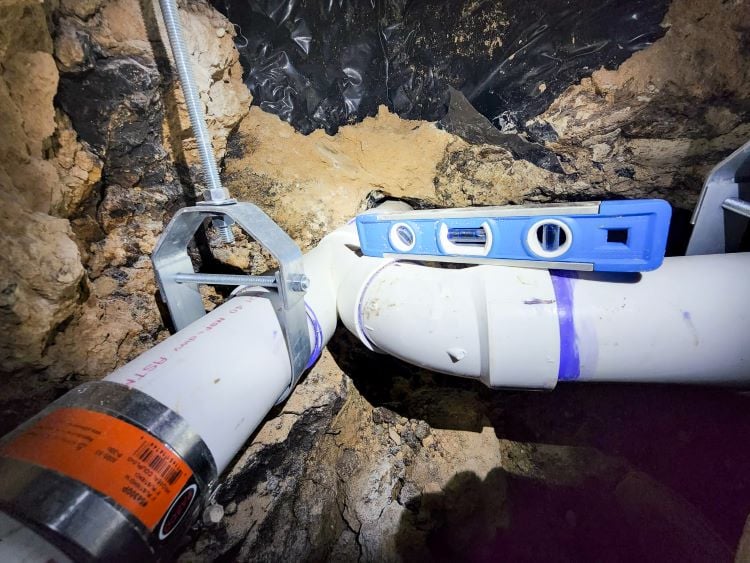Running a business means managing a lot of things, and plumbing might not always be on top of your list—until something goes wrong. Replacing cast iron pipes in commercial properties is crucial for preventing major plumbing disasters that can disrupt operations, damage property, and lead to significant financial loss. Cast iron pipes, commonly used in older commercial buildings, are prone to corrosion, cracking, and blockages over time. In this article, we will cover why cast iron pipe replacement is essential for businesses, the methods available, and how it benefits your commercial property.
Signs Your Business Needs Cast Iron Pipe Replacement
Frequent Plumbing Issues
If you notice recurring clogs, slow drains, or backups, it could indicate that your cast iron pipes are nearing the end of their lifespan. These issues are often caused by rust buildup, corrosion, or cracks in the pipes.
Water Quality Issues
Discolored water, especially reddish-brown or rusty water, is a clear sign that your cast iron pipes are deteriorating. This can pose a health risk to employees and customers alike.
Leaks and Water Damage
Visible water stains on walls, ceilings, or floors can suggest hidden leaks in your pipes. Cast iron pipes are susceptible to leaks as they age, which can cause structural damage if left untreated.
Benefits of Replacing Cast Iron Pipes in Commercial Properties
Replacing cast iron pipes in commercial buildings is a proactive step that can prevent severe damage and ensure the longevity of your plumbing system. Here are the key benefits:
Improved Water Flow
New piping systems provide smoother water flow, eliminating frequent clogs and ensuring your business operations run smoothly.
Cost Savings
Replacing old pipes can save you money in the long run by avoiding costly emergency repairs and water damage. It also helps lower your water bills by preventing leaks.
Compliance with Plumbing Codes
Outdated plumbing systems can result in non-compliance with local plumbing and safety codes. Replacing cast iron pipes ensures your business stays compliant, avoiding potential fines.
Pipe Replacement Methods for Commercial Properties
Traditional Pipe Replacement
This method involves excavating and replacing the old pipes with new ones. While effective, it can be disruptive and lead to extended downtime, which may not be ideal for businesses that need to remain operational during the replacement.
Trenchless Pipe Replacement
Trenchless methods, such as pipe bursting or cured-in-place pipe (CIPP) lining, are less invasive and do not require extensive digging. These options allow for quick and efficient pipe replacement with minimal disruption to your business.
Commercial Cast Iron Pipe Replacement FAQs
What is the difference between commercial and residential cast iron pipe replacement?
The primary difference between commercial and residential cast iron pipe replacement is the complexity and size of the plumbing systems involved. Commercial properties like restaurants, office buildings, and hospitals often have larger, more complex pipe systems that require specialized equipment and more experienced professionals.
Which types of businesses require cast iron pipe replacement?
Several types of businesses may need cast iron pipe replacement, especially if their buildings are older. These include:
- Restaurants
- Hotels
- Office buildings
- Shopping malls
- Hospitals
- Retail stores
- Apartment complexes
How do I know if my business needs cast iron pipe replacement?
Signs that your business may need cast iron pipe replacement include frequent clogs, water discoloration, leaks, water damage, or foul odors coming from your plumbing system. If your building is over 40 years old and has cast iron pipes, it’s likely time to consider a replacement.
What are the benefits of replacing cast iron pipes in commercial properties?
Benefits include improved water flow, lower water bills, prevention of major leaks or pipe bursts, and compliance with plumbing codes. It also enhances the overall safety and functionality of your plumbing system.
What methods are available for replacing cast iron pipes in commercial properties?
You can choose between traditional pipe replacement, which requires excavation, or trenchless methods like pipe bursting or cured-in-place pipe (CIPP) lining. Trenchless options are often preferred by businesses as they are less disruptive and faster to complete.
How long does it take to replace cast iron pipes in a commercial building?
The time it takes depends on the method used and the complexity of your plumbing system. Traditional methods may take several days or even weeks, while trenchless methods can often be completed in 1-3 days.
Is trenchless pipe replacement better for commercial properties?
Yes, trenchless pipe replacement is often better for commercial properties because it minimizes disruptions to your business operations. This method requires minimal digging and is usually faster than traditional replacement methods. However, trenchless options are not always possible depending on the state of the pipes.
Will I need to close my business during cast iron pipe replacement?
In most cases, businesses can remain operational during trenchless pipe replacement. Traditional pipe replacement may require temporary closures depending on the extent of the excavation needed. Your plumbing contractor will work with you to minimize downtime.
How much does it cost to replace cast iron pipes in a commercial building?
The cost varies depending on the size of the building, the method used, and the condition of the existing pipes. On average, trenchless pipe replacement costs between $150 and $450 per foot, while traditional replacement may be more expensive due to the need for excavation and restoration work.
How can regular maintenance help extend the life of my commercial plumbing system?
Regular maintenance, including inspections, cleanings, and minor repairs, can extend the life of your plumbing system. Routine upkeep helps prevent major issues such as leaks, corrosion, and blockages, saving you money on emergency repairs and ensuring your business remains compliant with local codes.
